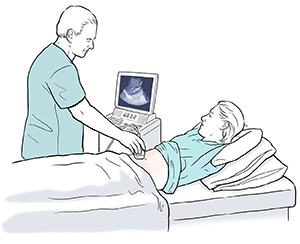Abdominal Pain and Early Pregnancy
The tests you had show that you're pregnant. But the exact cause of your pain isn’t clear.
Some pain and bleeding are common early in pregnancy. Often they stop, and you can go on to have a normal pregnancy and baby. Other times the pain or bleeding can be signs of a miscarriage or ectopic pregnancy. An ectopic pregnancy is a very serious problem. At this time, it's unclear if your pregnancy will continue normally, if you'll have a miscarriage, or if you could have an ectopic pregnancy. Below is some information about this.
Miscarriage
At this time, it's not known if you'll have a miscarriage, or if things will clear up and your pregnancy will continue normally. This is an emotionally difficult time. But it's important to understand that miscarriages are common.
About 1 or 2 out of every 10 pregnancies end this way. Some end even before a person knows they're pregnant. This happens for many reasons. Often the cause is never found. But it’s important that you know it's not your fault. It didn’t happen because you did anything wrong.
Having sex or exercising doesn't cause a miscarriage. These activities are usually safe unless you have pain or bleeding. Or unless your healthcare provider tells you to stop. Even minor falls won’t cause a miscarriage. Miscarriages happen because things weren't developing as they were supposed to. No medicine can prevent a miscarriage.
Ectopic pregnancy
In a normal pregnancy, the fertilized egg attaches to the wall of the uterus. In an ectopic or tubal pregnancy, the fertilized egg attaches outside the uterus, usually in the fallopian tube. In very rare cases, the egg attaches to an ovary or somewhere else in the belly (abdomen). An ectopic pregnancy is much less common than a miscarriage. But it's very serious. The baby can't survive. And as it grows it can burst (rupture) the fallopian tube. This can cause internal bleeding and even death. Risk factors for an ectopic pregnancy are:
Additional tests
It's not known what’s causing your symptoms. So you'll need more tests to figure out what the problem is. You may need the tests below.
Ultrasound

An ultrasound can often find a normal pregnancy as early as 4 to 5 weeks along. If the ultrasound does not show the baby inside the uterus, it means 1 of these things:
-
You have a normal pregnancy less than 4 weeks along
-
You are having or recently had a miscarriage
-
You have an ectopic pregnancy
Pregnancy hormone
An HCG test measures the amount of a pregnancy hormone in your blood. Comparing today's test result to a repeat test in 2 days will show if you have a normal pregnancy.
Laparoscopy
This is a type of surgery. The healthcare provider will put a tube with a light inside your belly to look directly at your pelvic organs. This test is used when it's not safe to wait 2 days for blood test results.
Important information
If you do have an ectopic pregnancy, there's a small chance that the growing fetus can tear the fallopian tube. This can cause severe internal bleeding. If this happens, you may have:
-
Sudden severe pain in your lower belly
-
Vaginal bleeding
-
Weakness, dizziness, and sometimes fainting
If any of these symptoms occur:
Home care
Follow these guidelines to help care for yourself at home:
-
Rest until your next exam. Don’t do any strenuous activities.
-
Eat a light diet with foods that are easy to digest.
-
Don’t have sex until your healthcare provider says it’s OK.
Follow-up care
Follow up with your healthcare provider, or as advised. If you were told to have a repeat blood test in 2 days, it’s important to get it done.
If you had an X-ray or ultrasound, a radiologist will review it. You'll be told of any new findings that may affect your care.
Call 911
Call 911 if you have any of these:
-
Severe pain and very heavy bleeding
-
Severe lightheadedness, passing out, or fainting
-
Rapid heart rate
-
Trouble breathing
-
Confused or having trouble waking up
When to get medical care
Call your healthcare provider right away if any of these occur:
-
The pain in your belly gets worse, either suddenly or slowly.
-
You're dizzy or weak when you stand.
-
You have heavy vaginal bleeding. This means soaking 1 pad an hour for 3 hours.
-
You have vaginal bleeding for more than 5 days.
-
You have repeated vomiting or diarrhea.
-
The pain in your belly moves to the lower right.
-
You have blood in your vomit or bowel movements. This will be dark red or black.
-
You have a fever of 100.4ºF (38ºC) or higher, or as advised by your provider.